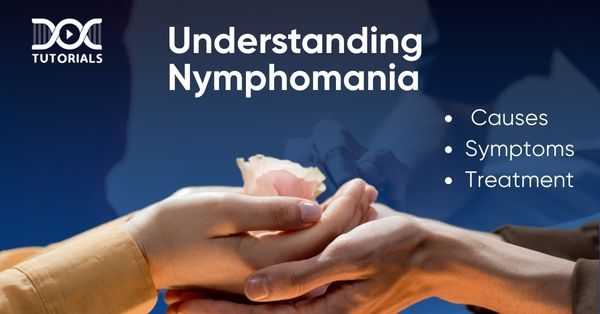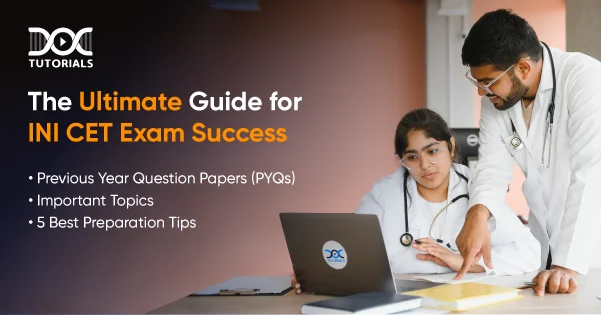Understanding Nymphomania: Causes, Symptoms, and Treatment

Nymphomania is a condition where an individual feels an intense and uncontrollable urge for sexual activity, which interferes with daily life. It is not officially classified as a mental disorder but is linked to underlying psychiatric conditions, neurological issues, and hormonal imbalances.
For medical students, understanding this topic is essential for diagnosing and managing impulse control disorders. This article breaks down the key points to help you get a better clinical understanding.
Keep reading for comprehensive insight!
What is Nymphomania?
Nymphomania (also known as hypersexuality, compulsive sexual behaviour or sexual addiction) is when an individual has an overwhelming urge for sex that disrupts daily life. This condition is characterised by persistent sexual fantasies, urges or behaviours that are hard to control and often cause distress in relationships, work and overall well-being.
While sex is a normal activity, excessive engagement to the point where it dominates one’s time and thoughts can become an addiction.
The key characteristics of nymphomania are as follows:
- Compulsions and Loss of Control – You engage in repeated sexual behaviours without really getting pleasure. You can’t control these urges and end up doing risky things like promiscuity.
- Emotional and Mental Distress – You feel guilty, ashamed or inadequate. Obsessive thoughts about sex are common.
- Debate in the Medical Community – Nymphomania is not universally recognised as a mental illness, but compulsive sexual behaviour is widely acknowledged as a serious condition that needs treatment.
- Impact on Life – Left untreated, it can damage relationships, careers and health. It can also cause huge emotional distress for you and your loved ones.
Nymphomania can affect any adult, although some studies suggest it may be more common in women and gay men.
What Causes Nymphomania?
The causes of nymphomania are unknown. However, research suggests some neurological, chemical and medical factors may be involved, such as:
- Brain Chemistry Imbalance – Dopamine, norepinephrine, and serotonin are neurotransmitters that regulate mood and behaviour. If these chemicals get out of balance, they can trigger sexual urges and compulsive behaviour.
- Brain Abnormalities and Damage – Certain conditions like dementia, epilepsy and bipolar disorder can affect the parts of the brain that control sexual impulses. Damage to the frontal lobe, prefrontal cortex or amygdala can also contribute to hypersexuality.
- Changes in Brain Function – Over time, compulsive sexual behaviour can rewire the brain, creating addictive patterns that require more and more stimulation to feel satisfied.
- Substance Abuse – The use of stimulants like cocaine and amphetamines and excessive alcohol consumption have been linked to increased sexual compulsions.
- Medication Side Effects – Some drugs (like levodopa for Parkinson’s disease) have been reported to cause increased sexual urges as a side effect.
What are the Symptoms of Nymphomania?
Following are the key symptoms of nymphomania:
- Persistent Sexual Fantasies and Urges – You have sexual thoughts that take up a lot of your time. These thoughts often feel uncontrollable.
- Excessive Sexual Behaviour – This includes frequent masturbation, compulsive porn consumption or sexual encounters with multiple partners.
- Loss of Control – You try to cut down on sexual activities but can’t stop, causing distress and disruption in your daily life.
- Emotional Struggles – You feel guilty, regretful or ashamed after sex, creating a cycle of emotional distress and compulsion.
- Using Sex as an Escape – Some use compulsive sexual behaviour as a way to cope with loneliness, stress, anxiety or depression.
- Engaging in Risky Sexual Activities – This includes unprotected sex, multiple partners, sex workers, or even autoerotic asphyxiation.
- Impact on Personal and Professional Life – Relationships suffer, work performance declines, and financial or legal problems arise from reckless behaviour.
How Do Doctors Diagnose and Evaluate Nymphomania?
Diagnosing nymphomania, or compulsive sexual behaviour, is tricky because there are no universal criteria. Thus, mental health professionals use various tools and evaluations to assess them.
Initial Assessment
A doctor or mental health professional may ask about your:
- Current health status, medical conditions, and family medical history.
- Medications, supplements, and herbal products you’re using.
- Alcohol, recreational drugs, and how they impact your behaviour.
- Frequency, intensity, and control over sexual thoughts, urges, and behaviours.
They may also talk to close family or friends with your permission.
Ruling Out Other Conditions
Hypersexuality can sometimes be a symptom of other conditions. Thus, healthcare professionals perform assessments to rule out:
- Bipolar disorder (manic episodes)
- Obsessive-compulsive disorder (OCD)
- Personality disorders
- Anxiety disorders
- Tourette’s disorder
- Hyperandrogenism (excess male hormones leading to increased libido)
Diagnostic Tools & Classification
Mental health professionals refer to widely used diagnostic manuals:
- DSM-5-TR (Diagnostic and Statistical Manual of Mental Disorders) – Compulsive sexual behaviour is not listed as a standalone disorder but may be diagnosed under impulse control disorders or behavioural addictions.
- ICD-11 (International Classification of Diseases) – The World Health Organisation (WHO) lists compulsive sexual Behaviour disorder under impulse control disorders.
Since there is no universally accepted diagnostic framework, specialists with expertise in addiction and compulsive behaviour are best to evaluate and treat nymphomania.
What are the Treatment Options for Nymphomania?
Nymphomania, or compulsive sexual behaviour, is typically managed through a combination of psychotherapy, medication, and support groups.
Psychotherapy (Talk Therapy)
Psychotherapy is one of the most effective ways to address compulsive sexual behaviour. It includes:
- Cognitive Behavioural Therapy (CBT) – This widely used therapy helps individuals recognise negative thought patterns that contribute to compulsive sexual urges and replace them with healthier responses. It also teaches practical skills to resist urges and avoid risky situations.
- Acceptance and Commitment Therapy (ACT) – Instead of trying to eliminate distressing thoughts, ACT focuses on accepting them and committing to actions aligned with personal values. This approach helps individuals build resilience against unhealthy sexual impulses.
- Mindfulness-Based Therapies – These techniques encourage patients to stay present and manage difficult emotions without turning to compulsive sexual behaviour as a coping mechanism. They can be especially useful for reducing anxiety and emotional distress.
- Psychodynamic Psychotherapy – This therapy helps individuals become more aware of unconscious motivations behind their behaviour, allowing them to resolve internal conflicts that may contribute to compulsive sexual activity.
Therapy can be conducted in individual, group, family, or couple sessions, depending on the patient’s needs.
Medications for Nymphomania
While no medication is specifically approved for treating nymphomania, certain drugs have shown effectiveness in managing compulsive sexual urges. These medications work by influencing brain chemicals that regulate behaviour, impulse control, and mood:
- Antidepressants (SSRIs) – Commonly used to treat depression, anxiety, and obsessive-compulsive disorder, Selective Serotonin Reuptake Inhibitors (SSRIs) help reduce intrusive sexual thoughts and compulsions.
- Naltrexone (Vivitrol®, Revia®) – Originally developed for opioid and alcohol addiction, naltrexone may also reduce the pleasure response associated with compulsive sexual behaviours, making them less reinforcing.
- Mood Stabilisers – These medications, often used to treat bipolar disorder, help regulate mood swings and impulsive behaviour. Lithium and valproate (Depakote®) are commonly prescribed options.
- Anti-Androgens – Used primarily in males, these medications lower testosterone levels and decrease the intensity of sexual urges. They are considered in severe cases where other treatments have failed.
- Anti-Anxiety Medications – For individuals whose compulsive sexual behaviour is linked to anxiety, medications like Buspirone may help in managing symptoms.
What are the Risk Factors for Nymphomania?
While the exact causes behind nymphomania are not known, the following risk factors increase the likelihood:
- With technology and social media, access to explicit content is at one’s fingertips. Constantly being exposed to it can fuel compulsive sexual urges.
- Compulsive sexual behaviour thrives in secrecy. The private nature of these activities allows the problem to get worse over time without intervention.
- There’s a strong link between compulsive sexual behaviour and addiction to alcohol or drugs. Substance abuse reduces inhibitions and increases impulsivity, making it harder to control sexual urges.
- Underlying psychological issues like depression, anxiety, or gambling addiction can lead to compulsive sexual behaviour. Some people use sex as a way to cope with emotional distress.
- If you have family members with addiction – to substances or behaviour – you’re more likely to be at risk. Unresolved family conflicts or dysfunction can also play a role.
- A history of physical or sexual abuse is a major risk factor. Trauma can lead to unhealthy coping mechanisms – including compulsive sexual behaviour – as a way to manage distressing emotions.
Knowing these risk factors will help you spot the early signs of compulsive sexual behaviour and opt for timely treatment.
What are the Complications of Nymphomania?
Left untreated, nymphomania can lead to several types of complications, like:
Mental & Emotional Consequences
- Guilt, shame, and low self-esteem always follow compulsive sexual activity and lead to emotional distress.
- Depression, severe anxiety, and suicidal thoughts due to feelings of helplessness and loss of control.
- Many people use drugs or alcohol as a coping mechanism and make the problem worse.
Physical Health Risks
- Sexually transmitted infections (STIs), including Human Immunodeficiency Virus (HIV), syphilis, and hepatitis, due to unsafe sex.
- Unplanned pregnancies from unprotected sex.
- Substance abuse associated with compulsive sexual behaviour can lead to long-term health problems.
Social & Professional Consequences
- Failed relationships due to deception, neglect or unable to maintain an emotional connection with a partner or family.
- Workplace problems like poor performance, loss of focus, and even job termination for engaging in sexual activity at work.
- Financial strain from spending too much on porn, escort services or other sexual outlets.
- Legal troubles including the risk of arrest for illegal sexual activity.
How to Prevent Nymphomania?
Preventing nymphomania is tough as the exact causes are still unknown. By managing triggers, getting early help, and looking after your overall mental health, you can gain more control over your impulses.
Early Intervention & Therapy
- Address sexual behaviour concerns as soon as they arise. Getting help early can stop obsessive tendencies from getting worse.
- Therapy can help individuals understand and manage underlying emotional issues, therefore reducing the chance of compulsive sexual behaviour.
Managing Mental Health & Substance Use
- Treat co-existing mental health conditions like anxiety, depression or bipolar disorder. Left untreated, these can contribute to impulsive sexual urges.
- Avoid substance abuse. Alcohol and recreational drugs impair judgement and increase the risk of engaging in risky or out-of-control sexual activity.
Recognising & Avoiding Triggers
- Identify your personal triggers and take steps to minimise exposure.
- Block access to pornographic or explicit content online to limit temptation.
- Change your routines, e.g. take different routes to avoid places or other environments that can cause triggers.
Redirecting Energy into Healthy Outlets
- Engage in physical activities like sports, yoga or meditation to channel energy into positive habits.
- Join hobby groups, clubs or volunteer organisations to socialise and keep your mind busy.
Commitment to Long-Term Well-Being
Managing compulsive sexual behaviour is a lifelong commitment. Focusing on your overall well-being, nurturing relationships, and getting help when you need it can make a big difference.
FAQs About Nymphomania
- What are the symptoms of nymphomania?
Sexual thoughts, sexual compulsions, risky sex, and associated emotional distress which interfere with daily life.
- How is nymphomania treated?
Therapy (CBT), medications (antidepressants), and support groups.
- How is nymphomania different from hypersexuality?
Nymphomania is specific to women. Meanwhile, hypersexuality is for all genders and focuses on compulsive urges.
- What are the psychological factors that can cause nymphomania?
Trauma, anxiety, depression, low self-esteem, and attachment issues can trigger compulsive sex as a coping mechanism.
- Can hormones play a role in nymphomania?
Yes, hormonal imbalances (high testosterone) can increase sexual desire and lead to compulsive behaviour.
Conclusion
Nymphomania, now recognised as hypersexuality disorder or compulsive sexual behaviour, is a condition that can affect an individual’s personal, social, and professional life. Identifying symptoms and opting for medical care can not only promote better outcomes but also reduce the overall impact on the other aspects of one’s life.
If you are a medical student, DocTutorials has an expansive repository of such topics, along with high-quality video lectures, question banks, test series, and expert guidance to help you crack your medical exams. Explore our NEET PG courses today and boost your chances of securing your medical seat!
Latest Blogs
-

NEET PG Exam 2025- Date, Pattern, Marking Scheme, Subject Wise Weightage, and Exam Mode
NEET PG Exam 2025 is the ultimate gateway for medical graduates aspiring to pursue postgraduate courses in medicine, including MD,…
-

INI CET Exam 2025: Your Roadmap to Success – Key Topics, Strategies, and Lessons from Last Year’s Papers
The INI CET exam is more than just a test; it’s a significant milestone for many medical students aiming to…
-

INI CET Exam Success: Previous Year Question Papers & Ultimate Guide – INI CET PYQ
One can feel overwhelmed while preparing for the INI CET (Institute of National Importance Combined Entrance Test). A vast syllabus,…




